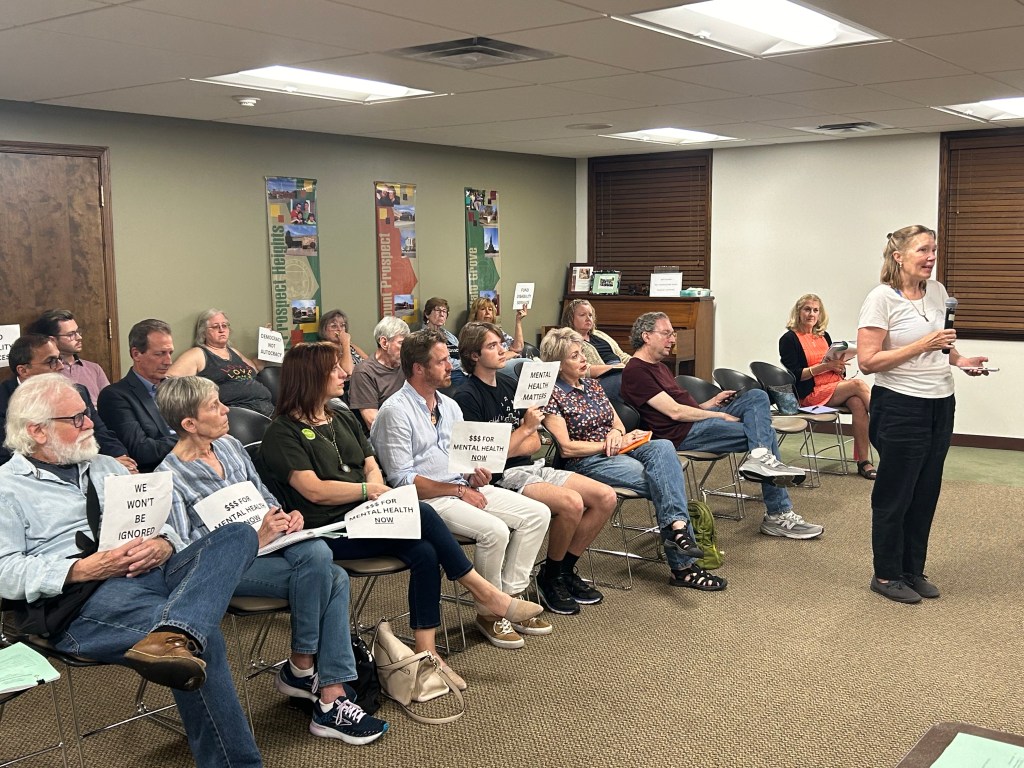Wheeling Township officials say their hands are “still tied” when it comes to levying a property tax to support mental health services, and they look to the General Assembly to overturn recent legislation during the fall veto session to alleviate that constriction.
More than a year ago, voters in Wheeling Township approved a new property tax to fund mental health services. But township officials have been refusing to impose taxes for the program, saying the referendum didn’t meet legal requirements – despite a state law that was passed to address those concerns.
We’re not saying we’re not necessarily going to fund it, we’re waiting to hear from the mental health board,” township Supervisor Kathy Penner told Pioneer Press after the July 23 board meeting.
During the meeting, Penner presented an update on the Community Mental Health Board referendum voters approved in November 2022. She also gave a detailed timeline of what has happened since.

Elizabeth Owens-Schiele/Pioneer Press
Wheeling Township Supervisor Kathy Penner speaks during the township board’s meeting July 23, 2024. (Elizabeth Owens-Schiele/for Pioneer Press)
“We’ve said all along we were concerned about the fact that [the referendum question] was not legally accurate. It wasn’t transparent to leave the $8 million off (what township officials estimate the referendum could potentially cost) and we asked that we put it back in. The attorney thought we were at risk,” Penner told Pioneer Press.
Wheeling Township officials have repeatedly questioned the language and legality of that referendum. The controversy continues there while other suburban governments, from Schaumburg to Naperville townships and Will County, are implementing new voter-approved tax funding for mental health programs.
Penner explained at the meeting that two pieces of state legislation have further complicated the board’s ability to fund the mental health board – which is to support not only mental health services but people with substance use disorders, and intellectual and developmental disabilities.
Legislation passed by the General Assembly in July 2023 attempted to validate mental health referendums that did not include certain property tax language. Wheeling Township attorney Ken Florey said the legislation validated any referendum approved prior to May 13, 2022.
However, it wasn’t until July 2022 that Wheeling Township citizens presented petitions to place a referendum on the ballot requesting .15% in new property taxes to support mental health services, Florey explained, but did not include tax transparency language.
Another piece of legislation passed by state lawmakers last November, Penner said, stated that Wheeling Township, and other townships where the 708 Community Mental Health Board referendums were approved, were prohibited from placing a corrected referendum question on ballots this year in the March and upcoming November elections.
After consulting with the law firm of Ancel Glick, Penner received a letter dated July 22, 2024, signed by partner Keri-Lyn Krafthefer, which indicates the state law “does not cure and validate the Township’s 2022 referendum question.” The reason, according to the law firm’s letter, is because the state legislation applied to referendums initiated by public bodies and not citizen-initiated ones.
“The Township’s 2022 ballot referendum question was a citizen petition-initiated … and is therefore not cured and validated” by the state law, according to the letter.
Penner said the law firm’s statement gives the township board pause.
She said at the board meeting “the law they passed does not cover us, and right now we cannot levy.”
“All of the other townships that did levy, they are at risk,” the township supervisor said.
Penner said she has asked community activists Arlen Gould and Lorri Grainawi, who helped form Advocatefor708.org, to lobby to overturn this legislation during the fall veto session.
Though other townships have moved forward with funding mental health services under the referendum, Wheeling Township has not.
“We’re being more methodical about it,” Penner told Pioneer Press.
Some of the more than two dozen township residents and other stakeholders in attendance at the July 23 meeting still questioned the board’s decisions on the issue.
Many attendees held signs that read “Mental Health Matters,” “$$$ for Mental Health Now” and “Fund Disability Services.”
“I hope this board does move forward and the mental health board comes up with a levy,” Lorri Grainawi told the board. “I hope this board approves an amount that actually serves the needs of the community. … Until that happens, we’ll all be here, showing up.”
The township is also awaiting a report from Harper College Business Solutions, which has been conducting a needs assessment of residents in Wheeling Township – which includes all or parts of Arlington Heights, Buffalo Grove, Des Plaines, Glenview, Mount Prospect, Northbrook, Palatine, Prospect Heights, Rolling Meadows and Wheeling.
“We all care, but our hands are tied on some of this,” Trustee Daniel Talken said during the meeting. “There are certain rules we have to follow.”
Arlington Heights resident Austin Mejdrich challenged that, asking the board to “meet voters half way.”
“You have incredibly large reserves,” Mejdrich said. “Yes, there have been issues with the referendum language and with the subsequent laws that have been passed, but there is funding available right now in this township.”
According to Regina Stapleton, director of finance and administration for Wheeling Township, the township has $3.8 million in reserves. Further, Stapleton said the township has distributed $66,410 to mental health agencies so far this year.
Elizabeth Owens-Schiele is a freelancer.

